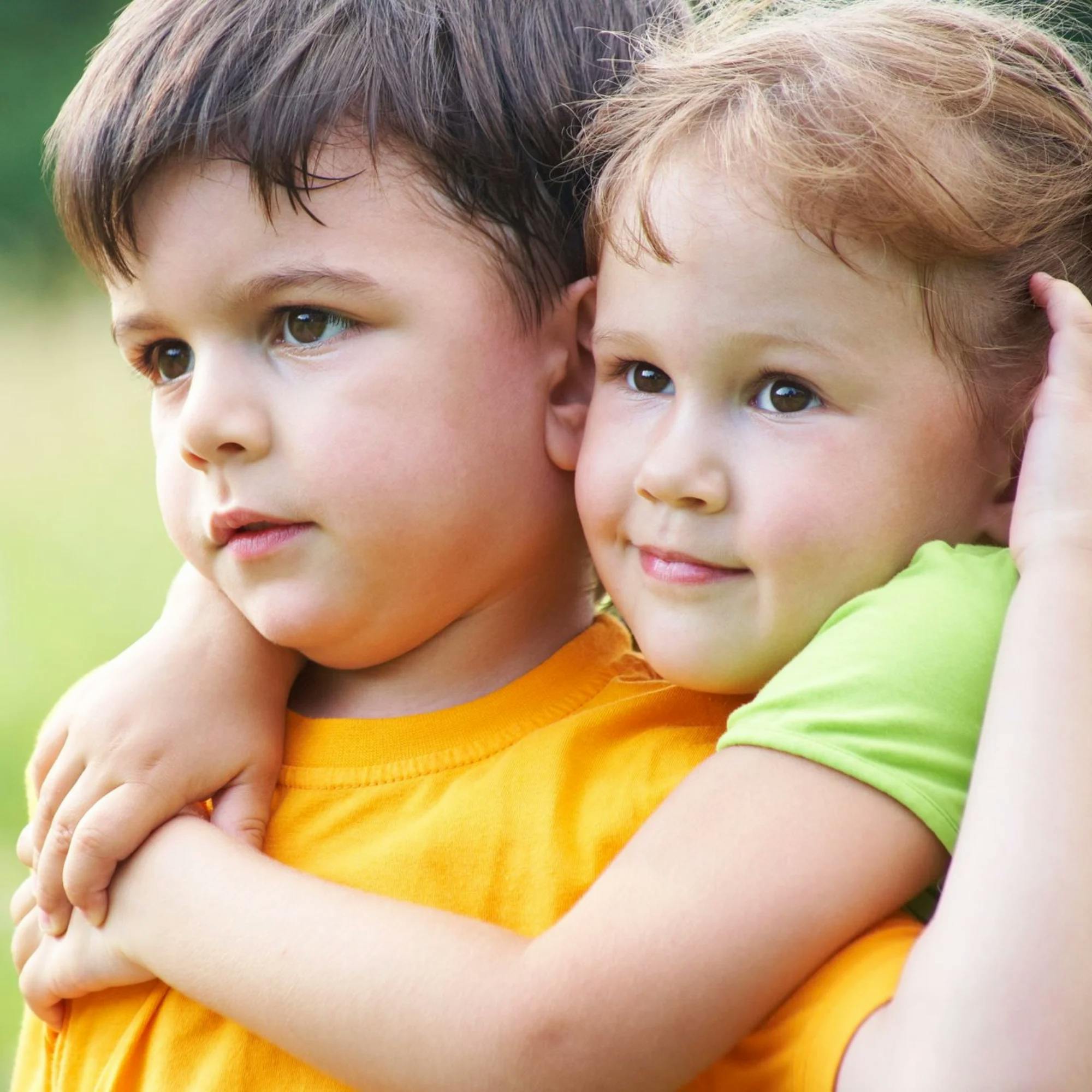If your 4-year-old isn’t talking much, you may have questions. When will my child talk? Why is my 4-year-old not talking? Other preschoolers are saying a lot more than my child…
Learning about the typical speech and language milestones for a 4-year-old is a good place to start. In this article, we cover the communication skills expected at this age, reasons your 4-year-old may not be talking, and where to go from here.
Curious or concerned?
Our free screener is tailored by age and covers all areas of speech, language, and feeding. Find out if your child might need speech therapy.
 Screener for children
Screener for childrenSpeech and language milestones for 4-year-olds
It helps to get familiar with the communication milestones for 4-year-olds. Even if a child isn’t speaking much yet, you can look at their receptive language skills. This refers to the language that they understand, not the words they say.
Once a child is 4 years old, they should be able to understand most of what’s said to them in any environment. Whether they’re following directions in preschool or listening to a family member at home, they should be able to make sense of the sentences spoken to them most of the time. Here are some examples:
Following directions: Four-year-olds can typically follow longer sets of directions–around three to four steps. If you tell your 4-year-old, “Take off your shoes, put them in the closet, then put your jacket away,” they should be able to complete these directions on their own, without forgetting a step or having to ask you to repeat it.
Sequencing: Similarly, 4-year-olds should begin to understand sequencing and related words. So if you give directions using words like “first” or “next,” they should be able to follow this order.


Understanding time: Time-based concepts are important for children to learn at this age–think words like today, yesterday, and tomorrow. When they learn these concepts, they can start to use these words themselves, and they’ll be better able to describe and communicate about things going on in their world.
Children usually say their first words at around 12 months, and expressive language skills continue to grow from there. During their second year, kids typically gain the following skills:
Having a spoken vocabulary of around 50 words
Using two-word phrases at around 24 months old
Engaging in short conversations
Beginning to use pronouns, such as me, my, mine
Beginning to communicate their feelings and emotions verbally, rather than physically (for example, saying how they feel instead of hitting)
Possibly trying to answer simple questions
Asking for things using words


So once a child is 4 years old, they typically have skills beyond these beginning stages of talking. You should see your 4-year-old demonstrate the following skills:
Describing emotions and feelings: Four-year-olds can typically express and name feelings. Whether it’s describing how the character in their book is feeling, or using words to explain their own emotions, this is an important milestone. It can be hard to guess what your child is feeling when they can’t clearly tell you, and challenging to deal with “big behaviors” that might arise as a result.
Answering questions: Along the same lines, when a 4-year-old child is asked a question, they can typically answer it clearly and correctly. This is related to their ability to understand questions, as well as having the vocabulary and grammar skills to form their response.
Participating in conversation: The older kids get, the more adult-like their speech should sound. Four-year-old milestones include being able to talk to a variety of people, both children and adults, and maintain a conversation. This includes staying mostly on topic, as well as answering and asking questions to keep the conversation progressing. Four-year-olds should also use correct grammar most of the time.
Telling stories: As children talk with others, you may notice their desire to tell stories. Maybe this involves recounting something that happened at the park, or telling a made-up story about pirates and princesses! At around 4 years old, your child should start verbally sharing their imagination with others.


What might cause a speech delay in a 4-year-old?
It is estimated that almost 8% of children in the U.S. have a speech, language, or swallowing problem.
A few years ago, a survey was completed assessing children’s development from ages 3 to 17. The data showed that of the 7.7% of children found to have a speech or swallowing delay:
5% had speech problems, or issues related to articulation of speech sounds
3.3% had language problems, or difficulty understanding and using words and sentences to communicate
Another way to frame it: About 1 in 12 children in the United States has a delay in communication abilities.
There are many reasons children may not begin talking on time. Here’s a look at why a 4-year-old may be a late talker:
Hearing problems
Any hearing loss can have a direct impact on speech and language development. If a child isn’t able to hear all the sounds in their language, that will affect their ability to clearly hear words and understand their meaning. They also will have difficulty learning how to pronounce words. If your child is delayed in speech and language development, it’s vital to rule out any hearing loss.
Oral-motor issues
Some children have a tough time with oral-motor movement. This refers to the ability to coordinate their lips, tongue, and jaw for speech production. Sometimes a condition called childhood apraxia of speech causes these oral-motor difficulties.
Concerned about your child's speech?
We're here for you. Get matched with a speech therapist who's experienced in your child's area of need and available when you are.
 Find a speech therapist
Find a speech therapistLearning disabilities
A speech and language delay may exist by itself. It may also coexist with other learning disabilities. Some of these include autism, ADHD, intellectual disabilities, and developmental disabilities.
Neurological problems
If a child has an underlying neurological problem, this can affect their ability to speak clearly. Cerebral palsy, muscular dystrophy, and traumatic brain injury are a few examples of diagnoses that can impact speech abilities.
Environmental factors
Children need to play every day! They need to be stimulated by and engaged in different play activities in order to develop language skills. If a child isn’t talked to often, isn’t hearing language modeled, and doesn’t have many chances to play, they may be more at risk for a communication delay. This is a great example of why cutting down on screen time is so important for speech and language development.
Developmental delay
Some children may not have other developmental delays, but for some reason they are delayed specifically in speech and language skills. Speech therapy is often needed to help them catch up.


How to seek a speech evaluation
If you're concerned about your child's speech, trust your instincts. Ask your child's pediatrician for a referral, or reach out directly to a speech therapist for a speech and language evaluation.
The earlier a child starts speech therapy, the more quickly they can make progress. Early intervention can also decrease the severity of their speech delay over time.
Contact your child’s pediatrician or a speech therapist to discuss getting on the list for an evaluation. This testing can determine if your child does need speech therapy and what the best treatment plan and approach will be. You can schedule an online evaluation with an Expressable speech therapist by clicking here.
4 ways to help your preschooler with speech at home
You may be wondering what else you can do alongside speech therapy. Good news: There is a lot you can practice with your 4-year-old at home! And it doesn’t require any big changes or expensive devices–just simple, everyday interactions. Let’s review them together.
1 Get down to your child’s level and play!
Many people don’t realize that play is such a huge part of a child’s development. Did you know that play mimics communication? When we play with someone, one person takes a turn, then the other person, and so on. These back-and-forth actions are similar to communication.
Taking the time to play with your child can make a big difference in their speech and language development! If you’re not sure where to start, try these fun and practical games and playtime ideas.
2 Make time to read together every day
Spending time reading with your child can have amazing benefits for their communication skills! Children who are read one book a day are exposed to 78,000 extra words per year. How incredible is that?
Reading together allows your child to learn more words, understand how sentences are structured, and even increase their phonological awareness skills. This refers to a child’s ability to recognize the sounds that make up words and their meanings. These speech and language abilities are linked to a child’s academic abilities as they grow older.
Plus, reading together helps strengthen the bond you have with your child. So make storytime part of your daily routine!


3 Practice imitation skills
Imitation abilities are also important for a child’s speech and language development. If your child isn’t yet mimicking any sounds, then spend some time practicing animal sounds, or the sounds of trains and cars. They tend to be fun and motivating for kids to copy!
Once your child is imitating these sounds, you can move onto speech sounds such as vowels and consonants–think simple babbles like “ma-ma.” As your child improves in this area, you can move on to simple word imitation.
If you’ve tried all of this and your child is still struggling with verbal imitation, try gesture imitation. Children have to learn to copy gestures and movements before moving on to speech. These can be simple gestures such as waving, blowing kisses, and clapping hands.
4 Model language for your child
One of the simplest, most effective things you can do for your kiddo is to model language for them. It’s easy: Just talk to them often, even if they don’t respond to you. Children learn so much from the people they spend the most time with. Your child can learn words, the meaning of words, and how to pronounce them simply just by watching and listening to what you do!
Remember, as your child’s caregiver and advocate, you play an incredibly important role in their life. Here at Expressable, we are honored to walk alongside families going through situations that may be similar to yours. We are here to be a source of information and support to help your child along their communication journey!
Find a speech therapist for your preschooler
If you’re concerned about your child’s communication, don’t hesitate to ask for help. Early intervention can make a big difference. Talk to your pediatrician, or contact Expressable to get matched with a speech therapist.
How Expressable Can Help
Concerned your child isn't reaching age-expected milestones? Looking for communication support from a professional? Expressable is a national online speech therapy practice serving children and adults. We treat all major areas of communication and feeding, offer flexible hours including evenings and weekends, and accept most major health insurance plans. We’re proud to have earned more than 3,000 5-star reviews from our clients (4.9/5 average).
Our therapy model is centered on parent and caregiver involvement. Research proves that empowering caregivers to participate in their loved one’s therapy leads to better outcomes. That’s why we combine live, 1-on-1 speech therapy with personalized education and home practice activities for faster progress.
Communication is more than words. It’s how we share how we feel and show who we are. We’re here to help you or your child do just that.

 Abby Barnes, M.S., CCC-SLP
Abby Barnes, M.S., CCC-SLP









